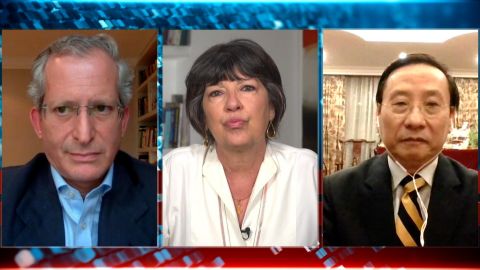Read Transcript EXPAND
ANTHONY GARDNER, FORMER U.S. AMBASSADOR TO THE EUROPEAN UNION: It’s really — it’s, I think, unfortunate timing, because things were going so well. The first six months, the Biden administration, we were hitting the reset button with Europe and with the E.U. in particular, and things were moving in the right direction. We were defusing our trade tensions. We were moving the direction of getting a good tax agreement at the OECD in Paris, which is very significant. We changed the tone of the whole debate. We launched at the U.S.-E.U. summit what would have been and still could be an important dialogue by the Trade and Technology Council. And now we have this spat. And I say it’s unfortunate because it could have a lot of ramifications. In terms of the Pacific, it could mean that the E.U. is not going to go forward with this deal with Australia. It could mean that this Trade and Technology Council is going to be delayed. In fact, we have got a bit of a hint of that from the European Commission president. And it could mean that the French are going to do even less favors for the British on the Northern Ireland protocol. And the French could now say, well, to its E.U. member state colleagues, I told you so. America is back means America is back in America. And, therefore, we need to do more in terms of strategic autonomy. So it’s unfortunate. The only people who win, I think, are those who want to see a divided alliance.
CHRISTIANE AMANPOUR: So that’s really interesting. And let’s just back up to make it clear that we’re talking about AUKUS, this new deal that the United States, Britain and Australia have struck to take nuclear-powered submarines for Australia to the Pacific. France is furious. It thought it had the deal. Before we get to this division that Beijing might seek to exploit with the alliance, some are saying that, actually, the United States, for all the answers might be causing right now, is staking out his position. It’s asking the world to bet on it as eventually being, I don’t want to say triumphant or dominant, but winning the competition with China. It’s a big bet by Australia to realign its position in the Pacific and also potentially an attempt to keep China in its zone and not elsewhere. Do you understand — I mean, do you buy that at all?
GARDNER: Yes. Yes, I do. And let’s remember that there are some countries who are applauding this. The Japanese have said so. The Indians have said. I think other countries in the Indo-Pacific are pleased that this agreement is going ahead. The French are obviously extremely angry. It is true that there have been other moments of crisis. This is not the first. I remember, when I took up my post in Brussels as ambassador the E.U. in 2014, it was a few weeks after the Edward Snowden affair. And, of course, we had the Iraq War. But this is also a very serious crisis. So I hope we can we can deal with it swiftly and involve France perhaps in this deal. It should not be seen as exclusionary.
About This Episode EXPAND
Victor Gao; Anthony Gardner; Bridget Cambria; Lee McIntyre
LEARN MORE


